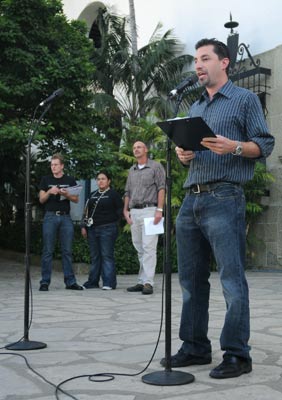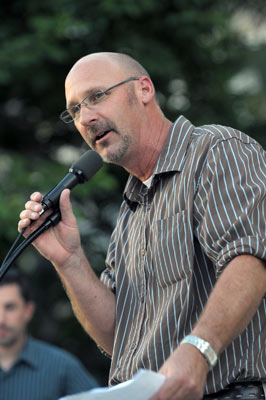Same-Sex Marriage Ban Overturned by California Supreme Court
A Gay Day for California's Gays

On Thursday, May 15, the California Supreme Court overturned the ban on same-sex marriage, making headlines across the globe and attracting praise from the more than 108,000 Golden State households that are registered as gay. The majority opinion, penned by Chief Justice Ronald M. George, stated, “An individual’s sexual orientation-like a person’s race or gender-does not constitute a legitimate basis upon which to deny or withhold legal rights.” Overturning Proposition 22, the voter-approved initiative from 2000 that defined marriage as a union between one man and one woman, the 4-3 ruling made California the second state in the U.S. to allow gays and lesbians the right to marry. Massachusetts extended such rights in 2004.

building in San Francisco last Thursday after the court's ruling was announced.
In response to the ruling, Pacific Pride Foundation (PPF) and Just Communities organized a rally at the Courthouse Sunken Gardens on Thursday evening, for which upward of 200 people came out to celebrate, with various elected officials, activists, and religious leaders taking the mike to voice their support of the decision.
“Today, I am proud of the State of California and its Supreme Court,” Santa Barbara City Councilmember Helene Schneider said to loud applause. “They say June is a great month to get married, and that is certainly going to be true this June.”
The palpable excitement was tempered by speakers reminding the audience that the fight to retain the rights granted in the decision continues. Conservative groups have mounted a campaign to get on November’s general election ballot an amendment to the California State Constitution banning same-sex marriage.
“This is just the beginning of the fight of our lives,” said David Selberg, the executive director of PPF, Santa Barbara’s leading gay rights and AIDS education/service organization. “Right-wing extremists have raised millions of dollars” to get an initiative on November’s ballot. “But Governor [Arnold] Schwarzenegger has promised to veto such an amendment : and we have to hold him to that promise.”

Jared Schwartz, executive director of Just Communities-a Central Coast nonprofit aimed at “promoting harmony” between culturally different groups-echoed this sentiment, saying that as “a straight man who believes in justice and equality,” his commitment to his wife was made stronger by the court’s decision. “This ruling makes my family stronger because it is part of a just society,” he said. “Love-not gender-is at the core of a relationship.”
Many people saw the court’s decision as a stepping-stone to hopefully addressing larger matters. “As a queer person, marriage isn’t the end-all,” said Tara Uliasz, a special education teacher in Santa Barbara. “Other issues need to be talked about,” Uliasz said, citing obtaining full parental rights, ending job discrimination, and educating about the high rate of teen suicide among lesbian and gay youths as examples of more pressing concerns. The ruling’s relation to bigger issues is also resonating with those gay Californians who aren’t in long-term committed relationships and contend that the ruling won’t change their everyday lives.

But the overriding sense in the community is that this is a huge deal. PPF’s Selberg said that he received more than 30 phone calls on Thursday in the first few hours after the ruling was announced asking when, how, and where gay couples could get married. Jill Shalhoob, owner of Jill’s Place on Santa Barbara Street and a major organizer of lesbian community events in Santa Barbara, said she received more than 40 emails from people sharing their jubilation about the ruling. “In the last day, there have been so many happy couples who can’t wait to get married,” Shalhoob said late last Friday night after finishing up at the restaurant. “I think it’s definitely making a difference in the community, and I think it’s good to have positive energy go toward that.” She said that one of her customers that night was a closeted woman who came into the restaurant wearing a T-shirt with two lesbians printed on it. “I’ve never seen her be so out,” Shalhoob said enthusiastically. “This ruling is building confidence.”
Former state assemblymember Hannah-Beth Jackson, who is running for the 19th District’s State Senate seat in November, also believes that the ruling is more than a symbolic gesture. Predicting the ruling will have a “significant impact on the community,” Jackson explained, “It has affirmed that same-sex couples have the same rights as all the rest of us : and I think that’s a move forward for civil rights in this state and certainly for our community.”
Even for gays and lesbians who don’t believe in the institution of marriage, the Supreme Court’s decision holds no less significance. “We’ve been in loving relationships for years, and they need to be recognized,” said Selberg on Friday, after he’d had some time to digest the ruling’s true meaning, “and the way our culture does that is through the institution of marriage.” He explained that marriage equates to family and the support of a faith community, as well as the legal rights married heterosexuals enjoy that those currently in same-sex domestic partnerships do not. Whether or not people agree with the institution itself, Selberg explained, extending the right to gays and lesbians is a step toward recognizing their equality in society.
Of course, not everyone is pleased with last Thursday’s ruling. Everett Rice, legislative coordinator with the California Family Council (CFC), said, “Marriage, throughout history, whether you want to make it a religious or social issue, has always been understood to be between a man and a woman,” he explained. “It has never, with the exception of another activist court in Massachusetts, been anything other than that. What the court’s doing is changing that definition.”
Rice’s boss, Ron Prentice, the CFC’s chief executive officer, is one of the main players in pushing for an initiative on the November 2008 ballot that would amend California’s Constitution to define marriage as strictly between one man and one woman, effectively reversing the Supreme Court’s decision. “We are focused on getting Californians aware of what’s going on,” Rice explained, referring to the charge that the justices are setting dangerous precedent by legislating from the bench. “In a general sense, we want to educate all of California about what’s actually going on and what the [decision’s] impact would be in the long run.”
Back in Santa Barbara last Thursday, there was plenty of hope and happiness for the long run. Many rally-goers kept the celebration alive at Epiphany Restaurant on Victoria Street, where an after-party carried on into the wee hours. One such reveler was UCSB employee Barbara Hirsch, who was sitting with a group of middle-aged lesbians. “This is a real symbol of American progress,” she explained. “It’s a quintessential example of progress for the human race.”
Jason Rangel, a volunteer for PPF, agreed. “When I heard about the ruling,” he explained while standing at Epiphany’s bar on Thursday, “all I could think was, ‘Common sense prevails. Finally.'”



